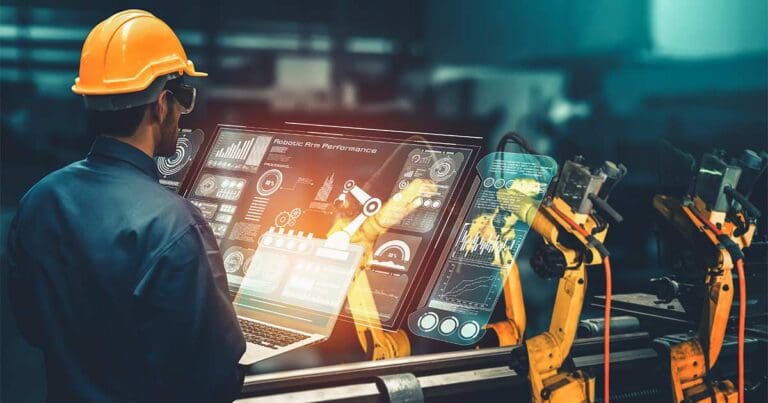Generative AI & Its Impact on the Job Market: It’s Not All Bad News

It’s been a banner year for Generative AI as artificial intelligence continues to evolve at an astonishing rate.
This cutting-edge technology has become a game-changer in various industries, pushing the boundaries of what was once thought possible, and with 40% of executives and managers foreseeing a significant increase in AI investment through the next year and beyond, it is evident that the impact of Generative AI will continue to have a ripple effect in the coming years.
As companies gear up to embrace this transformative force, the question arises: what does this mean for the future job market and the changing hiring needs of businesses?
While there’s no singular definitive answer to this question, organizations and employers would be wise to prepare for a significant shift in the jobs landscape.
What is Generative AI vs. AI?
Generative AI is a subset of artificial intelligence that uses machine learning techniques to produce new data based on existing data sets.
While traditional AI models are often designed to perform specific tasks using the data they’re trained on without the same “creativity”, Generative AI models, such as GANs (Generative Adversarial Networks), operate differently.
In a GAN, two networks compete: one generates new data, while the other evaluates its authenticity against the original data, forming a creative feedback loop.
This dynamic enables Generative AI to produce entirely new and unique outputs, such as writing articles, crafting art, or composing music.
Real-world examples of Generative AI
Real-world examples of Generative AI include AI-generated art, AI code generation, Generative Adversarial Networks (GANs) image manipulation, and AI-generated text.
AI-generated art
Computer-generated art and design have been revolutionized by Generative AI.
Artists and designers are utilizing advanced AI algorithms to produce unique and mesmerizing pieces of art, designs, and animations.
AI acts as a co-creator, interpreting inputs, and generating output that can range from surreal to hyperrealistic visuals.
One notable example is the portrait of Edmond de Belamy, which was created using Generative Adversarial Networks (GANs) and sold for an astounding $432,500 at Christie’s auction house.
AI code generation
AI code generation is another area where Generative AI has shown its transformative potential.
It involves the use of AI models to write code, potentially increasing programmer efficiency and reducing the chance of human error.
Companies like OpenAI, with their product GitHub Copilot, are already pioneering this approach, demonstrating how AI can assist in writing better code more quickly.
Generative Adversarial Networks (GANs) image manipulation
Generative Adversarial Networks (GANs) have made significant strides in the field of image manipulation, enabling the creation of realistic images from simple sketches or transforming day images into night.
This technology opens up wide possibilities for graphic designers, photographers, and visual artists, offering them new tools for their creative processes.
It also has its risks, such as the potential for creating fake images, deepfakes, or altering images in a way that can be undetectable by the human eye.
AI-generated text
AI-generated text is revolutionizing sectors like customer service, with AI-powered chatbots providing real-time assistance to customers, offering swift and accurate responses, and thereby improving the overall customer experience.
In marketing, Generative AI is utilized to create engaging content, tailored product descriptions, and personalized email campaigns.
Furthermore, it’s leveraged in newsrooms and publishing houses to generate story outlines, draft initial versions of articles, or even write entire pieces, scaling up content production and reducing the time spent on repetitive tasks.
Impact of Generative AI on the job market
The impact of Generative AI on the job market has far-reaching implications including a shift in business priorities, new Generative AI job roles and opportunities, and Generative AI hiring needs and challenges.
The shift in business priorities
An increasing number of businesses are turning to AI as they recognize its potential to drive efficiency and innovation, as well as realizing significant cost savings.
AI-powered systems streamline operations, automate repetitive tasks, and enable quicker decision-making, thereby enhancing productivity and reducing operating costs by up to 30%.
Moreover, the ability of AI to generate novel solutions and insights facilitates breakthroughs, fostering a culture of innovation and giving businesses a competitive edge in their respective markets.
New Generative AI job roles and opportunities
As AI systems become increasingly sophisticated, certain job roles, particularly those involving routine tasks such as data entry, administrative support, and certain aspects of manufacturing and transport, may be significantly reduced or entirely eliminated.
On the other hand, the rise of AI will inevitably give birth to new job roles and opportunities.
These emerging fields will require workers to gain new skill sets, emphasizing the importance of adaptability and continuous learning.
In the rapidly evolving age of AI, the ability to upskill and reskill will be a definitive factor in securing employment and thriving in the changing job landscape.
Generative AI hiring needs and challenges
The dawn of the AI era has spiked the demand for AI specialists and roles relating to data science, machine learning, and AI ethics, reflecting the crucial part these professionals play in harnessing the power of AI.
However, finding and retaining skilled professionals in this highly competitive market is a pressing challenge, as the supply of qualified AI talent is still catching up with the increasing demand.
In light of these trends, businesses must prioritize upskilling and reskilling their existing workforce as well as widening their searches by working with staffing agencies that specialize in Tech, Digital Marketing, and IT role placements.
Emerging Generative AI job roles
There are a number of Generative AI job roles growing in popularity like AI ethicists, data detectives, and AI maintenance engineers.
- AI ethicists
- AI trainers
- Data detectives
- Data scientists
- AI specialists
- AI maintenance engineers
- Machine learning developers
AI ethicists for Generative AI
AI ethicists are specialists who will address the moral and ethical questions around the use of AI.
They will play a pivotal role in creating frameworks and guidelines for the responsible and ethical use of AI, ensuring the safety of individuals and collective society.
AI trainers for Generative AI
AI trainers are professionals who train AI models by providing annotated data sets.
They play a crucial role in selecting the right data, designing algorithms, testing solutions, and monitoring performance so that AI systems can generate accurate outputs.
Data detectives for Generative AI
Data detectives are experts in identifying patterns in large datasets to create actionable insights for businesses.
They enable the AI systems to produce novel solutions based on the data at hand, making them an indispensable part of any organization leveraging AI.
Data scientists for Generative AI
Data scientists collate, analyze, and interpret data to inform decision-making within organizations.
While this role existed before the AI boom, the demand for these professionals has increased significantly as they provide the necessary knowledge for AI models to learn from historical data and create predictive models that generate valuable insights.
AI specialists for Generative AI
AI specialists are responsible for designing and training AI systems.
They use their knowledge of machine learning, deep learning, and AI principles to create models that can learn from data, predict outcomes, and make autonomous decisions.
AI maintenance engineers for Generative AI
AI maintenance engineers ensure the smooth operation of AI systems, performing necessary updates and troubleshooting any issues that arise.
They play a crucial role in keeping AI models working effectively and efficiently, thus guaranteeing that the benefits of these systems are realized without interruption.
Machine learning developers for Generative AI
Machine learning developers create algorithms and code that enable AI systems to learn from data, recognize patterns, and make autonomous decisions.
They play a critical role in developing the intelligence of AI models and ensuring their accuracy and reliability.
Preparing for a Generative AI-driven future
There are several components in preparing for a Generative AI-driven future including understanding the AI-driven job market, AI in education, and prioritizing interdisciplinary knowledge.
Generative AI-driven job market
Professionals must commit to lifelong learning, and developing proficiency in AI-related skills such as machine learning, data analytics, and AI ethics, to remain relevant in the AI-driven job market.
Engaging in hands-on projects or internships can provide practical experience in deploying AI technologies, complementing theoretical knowledge and making professionals more desirable to employers.
Additionally, cultivating soft skills like effective communication, problem-solving, and adaptability can enhance one’s ability to work collaboratively with AI and add a human touch to technology-driven roles.
Generative AI in education
Educational institutions and businesses both play a pivotal role in fostering AI skills in the evolving job landscape.
Educational institutions, from schools to universities, should integrate AI-related curricula and hands-on learning experiences to equip students with the necessary theoretical and practical knowledge.
Concurrently, businesses can contribute by offering internships, apprenticeships, and continuous learning opportunities, allowing individuals to gain real-world AI experience and stay abreast of the rapidly evolving technology landscape.
Prioritizing interdisciplinary knowledge
In the realm of artificial intelligence, supplementing AI skills with industry-specific expertise can tremendously enhance the efficacy and applicability of AI solutions.
Workers who possess both a deep understanding of AI and specialized knowledge in areas such as medicine, law, or finance can create more targeted and effective AI models.
They are uniquely positioned to bridge the gap between technology and practical application, ensuring that AI systems are designed and implemented in ways that most effectively meet the specific needs of their industry.
The future of Generative AI job roles
The transformative potential of Generative AI is undeniable, poised to revolutionize not just technology, but virtually all sectors of industry and society.
As we stand on the cusp of this new era, it’s imperative for businesses and professionals to embrace the changes, adapt, and prepare for the future.
Harnessing AI’s capabilities offers a dynamic and cutting-edge approach to problem-solving, decision-making, and creating value.
The future belongs to those who can navigate this AI-driven landscape, turning challenges into opportunities for growth, innovation, and success.
Looking to hire top-tier Tech, Digital Marketing, or Creative Talent? We can help.
Every year, Mondo helps to fill over 2,000 open positions nationwide.
More articles about hiring and industry trends:
- Understanding GenAI and Maximizing Its Potential in Business
- The Future of Recruiting: Top 10 Challenges in Tech and Digital Hiring
- Boomers, Millennials & Zoomers: From Tradition to Transition in the Job Market
- How To Conquer the Top 10 Most Common Recruitment Challenges
- The Rise of Working Moms & the Role of Remote Work
- How to Recruit Top Data Scientists in a Competitive Job Market
- Lessons From Unicorn Companies: Hiring Strategies for Rapid Growth
- 8 Myths About Hiring Gig Workers Every Employer Should Know
- The Costly Consequences of Project Delays and How To Prevent Them
- Big Tech Job Cuts Don’t Mean Demand for Tech Professionals Is Over



